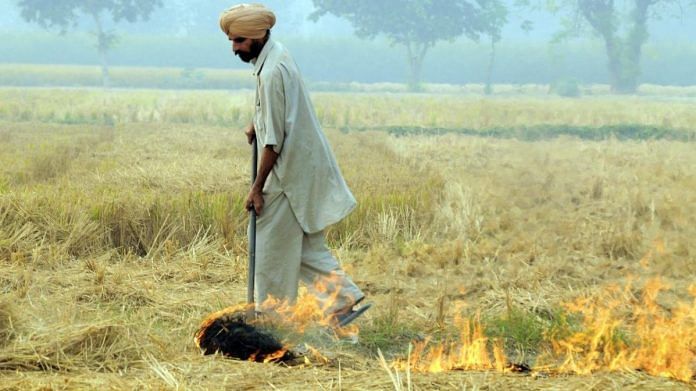From mixing the stubble into soil, to making manure and use in the packaging industry, there are a lot of ways in which the problem of stubble burning can be solved.
North-west India is currently in the grips of a poisonous smog, produced by farmers through paddy straw and stubble burning. The smog is affecting the germination and growth of crops, as well has having a harmful effect on human health.
Farmers are facing a delay in sowing wheat and other rabi crops. This is because in the absence of sunshine, the soil is not ready for sowing. The delay in sowing can cause loss in the production and productivity of crops in the entire green revolution belt. This problem needs to be solved immediately, and preventive steps have to be put in place in the long run.
Innovative thinking needed
The handling of this problem needs innovative thinking and creative solutions. Technically, it can be resolved in several ways.
Technology is available to cut rice straw and stubbles into small pieces and mix them in the soil to increase soil fertility. But the machines for this are costly, beyond the reach of common farmers. Even if there are machines, they involve expenses on diesel to operate them. This just adds to the cost of cultivation, whereas burning of crop residue does not involve any cost to individual farmers.
Another solution involves the collection of paddy straw in the form of bundles to be used for various other purposes. This includes the use of paddy straw for packaging fragile items like crockery and glass, and as raw material for electricity production in the specifically-designed thermal plants.
The paddy residue can also be used for the production of manure after collecting it at one place. This can be extremely useful in terms of generation of employment for agricultural labourers, who have been made redundant by combine harvesters. At village level, agricultural workers can be employed by village panchayats to collect paddy straw and paid wages under MNREGA. The collected straw can be dumped at a common place identified by the panchayat. Earth can be dug to produce manure, to be sold at a nominal price to the villagers.
Basmati paddy straw is a nutritious fodder for animals. This straw is not burnt. There is a need to explore the possibility of using common paddy straw for animal feed by mixing with other fodder. A recommendation from the Punjab Agricultural University and Guru Angad Dev Veterinary and Animal Sciences University is needed immediately in this regard. It can be another useful way to consume this straw without creating health and environment problems.
In the long run, area under paddy should be reduced by encouraging the cultivation of high value crops like vegetables, fruits, oil seeds, pulses, maize, bajra, etc. This will save water, energy, and also keep our air clean. In place of common varieties of rice, the cultivation of basmati rice has to be encouraged.
The solutions require serious involvement of the government for financial support, creative research-based suggestions by agricultural and environment experts, and healthy engagement of the farming community.
Without involving the local farming community, this issue will remain. It should not look as though only farmers have to pay the price for dealing with this problem.
The author is professor at the Centre for Research in Rural and Industrial Development, Chandigarh
Also read: Alien paddy is causing stubble burning, but don’t blame Punjab for Delhi smog this time




Fine one. The government can authorise panchayats for purchase of subsidised machines. 4 to 5 villages can come together. The faulty panchayats need to be fined heavily. Cost of diesel can be ignored keeping in view the health benefits. Paddy straw can be sold to thermals of nearby states or can be exported for fuel to other nations. It’s use as insulating material and for mushroom cultivation should be further explored